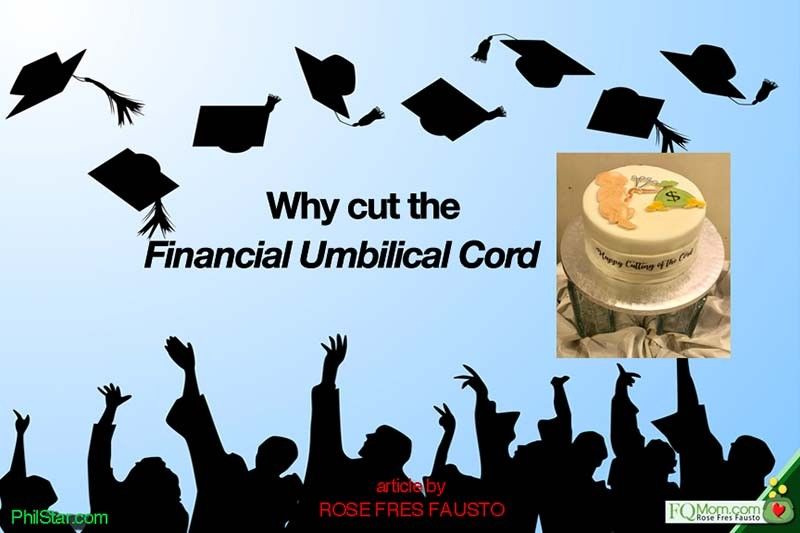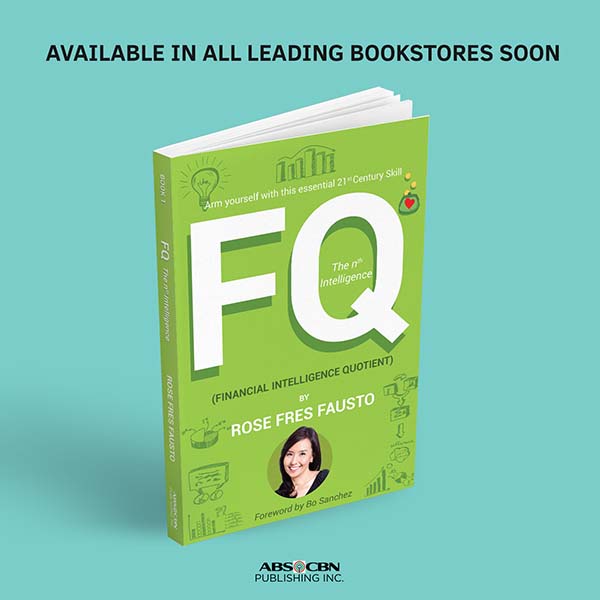Why cut the financial umbilical cord


Last weekend was a big milestone in our family. Our youngest child, Anton, graduated from college with a degree in BS Management major in Communications Technology at the Ateneo de Manila University! Yes, my husband and I are now graduates (i.e. graduates from an important responsibility). Although we know that parenting doesn’t stop, we have successfully completed what we have set out to do in this journey – raise them well, nurture them, and fund their education until college, and it surely feels great!
While I was looking at my sons’ graduation photos in our library at home, I felt sentimental and tears started rolling down my eyes. Memories of the three young Martin, Enrique and Anton rushed to my mind – the three of them doing their respective homework in this same library when I was their tutor. In between studies, they would eat their merienda, kid around, make fun of each other including me, and peep through the balcony door to check if there are kids already playing at the park across our house. Thoughts of school challenges, triumphs, failures, stories of terror and inspiring teachers, classmates, school activities and many more came back to mind.

Then came a sigh of relief and profound feeling of gratitude and accomplishment to realize that indeed, we’ve done it! The oldest now has his own brand audit and consultancy firm, the second is a research associate at a top foreign stock brokerage, and the youngest soon to join the work force – okay, we agreed that he will enjoy some days of vacationing, gotta do that most awaited graduation summer outing first before buckling down to real work in the real world.
Sharing a family tradition
From son number 1 to 2 to 3, we have observed the tradition of cutting the financial umbilical cord upon graduation. Yes, their allowance stops upon graduation, but they are still welcome to stay with us with free board and lodging, until a certain time (but this “certain time” belongs to another article). ![]()
When my friends heard about this tradition, they asked, “You cut their allowance even if they still don’t have a job?” My answer was yes, and it may be something worth considering for other parents.
Last Saturday, we celebrated our last cutting of the cord with our family and a few friends of our new graduate. I had a special cake made by my friend for this occasion.

Paano naman kami?
The follow up question from my friends regarding the cutting of the cord was this, “You can confidently do that because your sons have been saving and investing straight out of their diapers, but how about for children who don’t have money yet? What do you suggest?” Here’s my answer, “Cut their financial umbilical cord once they find a job, or at an agreed upon date, whichever comes first.” I add an agreed upon date because I see a lot of graduates of financially comfortable families who do not feel the urge to look for a source of livelihood.
Sometimes the career advice “follow your passion” backfires. Yes, it’s good for them to be aware of the importance of doing what they are gifted with, but the reality of life is that real work is not always exciting to do. Ideas of “jumping to work with glee every single day” or “if you love what you do, you will never work a single day” are figures of speech at best. Please remind your kids not to take them literally. Remind them that the most important thing to look for in finding their first job is training and honing their skills in a company they share values with. And they have to balance this off with earning.
Cutting their financial umbilical cord will motivate them to find a source of living right away (unless you’re giving them a fat trust fund that they can access right away). It will avoid prolonging their “rest” after graduation and becoming too picky with work.
When we complain of our kids as being too entitled, we ought to check our parenting – what have we done to make them so?
Hunger as a competitive advantage
I have heard of some companies shying away from graduates of top universities because of this prevalent feeling of entitlement among them. Because mom and dad can always provide, they are not so concerned about losing their job, or they are so ready to tender their resignation letters after only a few months, once they feel they are not “following their passion or contributing something significant” anymore. Again, here’s a reminder, “Hey kid, you don’t get to significantly contribute to society right away without even honing a skill, and you don’t get to hone a skill in a couple of months!”
On the other hand, there is a growing preference of employers for the graduates of second-tier universities because they are hungrier. These are the graduates who are expected by their parents to help out financially in the family right away. Sometimes even the schooling of their younger siblings are expected from them. All these responsibilities make them want the jobs more and value them more as well.
Wealthier parents do not want this disadvantage for their children when it comes to job hunting and so implementing this cutting of the financial umbilical cord can help narrow that hunger gap. It might also be good to remind your children to tone down the “follow your passion” arrogance and be more realistic.
Learning more from the umbilical cord analogy
If you are not yet convinced about the benefits of cutting the financial umbilical cord upon graduation, let me tell you more about the umbilical cord.
The umbilical cord is the connection between the fetus and the mother’s placenta. The cord enables the supply of oxygenated and nutrient-rich blood from the placenta to the fetus. Conversely, the fetal heart pumps deoxygenated, nutrient-depleted blood through the umbilical cord back to the placenta. The placenta is expelled from the uterus alongside the fetus 15 to 30 minutes after the baby is delivered.
Nature provides an expiry in the dependence and we ought to learn from it. But what sometimes happens is that parents continue this dependence indefinitely. They continue to finance the needs of their children, and sometimes even extend it to their children’s children. And I’m not talking about occasional gifts but even the day-to-day expenses, tuition, baon, etc. of their grandchildren, rationalizing, “Kawawa naman sila!”
Imagine this – If you prolong the financial dependence of your child, you will continue to receive “deoxygenated, nutrient-depleted blood!” This will be in the form of your inability to concentrate on building your own nest egg. Honestly, if you allow this to happen, “Pareho kayong kawawa!” You will be unable to prepare for your decent old age, and your child will never become financially independent from you.
So as you celebrate or prepare for your children’s graduation, you may wish to include this important step in raising your children to have high FQ: Cut their financial umbilical cord once they graduate. Cheers to high FQ! ![]()
********************
ANNOUNCEMENTS
1. A great way to prepare your children for the cutting of the financial umbilical cord is to be serious with the honing of their nth intelligence. Watch out for my new book "FQ: The nth Intelligence." Interested parties may contact me for pre-orders.

2. Why don’t you and your kids both take the FQ Test challenge? Click link to take the test. http://rebrand.ly/FQTest

Rose Fres Fausto is a speaker and author of bestselling books “Raising Pinoy Boys” and “The Retelling of The Richest Man in Babylon” (English and Filipino versions). Click this link to read samples – Books of FQ Mom. She is a behavioral economist, a certified gallup strengths coach and the grand prize winner of the first Sinag Financial Literacy Digital Journalism Awards. Follow her on Facebook & YouTube as FQ Mom and Twitter & Instagram as theFQMom.



















